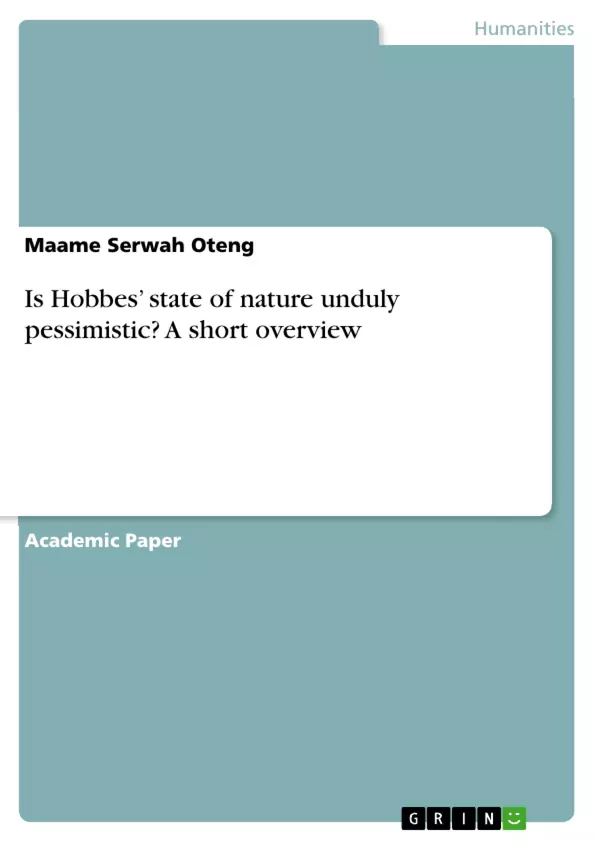This essay examines the state of nature according to Thomas Hobbes. The state of nature, which has its ancient roots in political philosophy, is also an essential tool that has been used by some political philosophers as a bridge and platform for building a civil society. The state of nature highlights on life without a government, a state or even laws. It also focuses on a society in which humans have their own private judgment in the sense that each individual has the right to act and judge in his or her own case whenever issues such as disputes arise with no authority having to influence the individual’s decisions. It is a subject that has been widely studied by well-known English, Scottish, French philosophers such as John Locke, David Hume, Thomas Hobbes and Montesquieu who talked about the state of nature in some of their works such as the Leviathan (1651), the Second Treatise on Civil Government (1690), a Treatise of Human Nature (1738) and the Spirit of the Laws (1748).
Inhaltsverzeichnis (Table of Contents)
- Is Hobbes' State of Nature Unduly Pessimistic?
- What is the state of nature?
- Thomas Hobbes and his views on the state of nature
- Comparing Hobbes' view on the state of nature with other philosophers
- Is it fair to say that Hobbes' view on the state of nature is unduly pessimistic?
Zielsetzung und Themenschwerpunkte (Objectives and Key Themes)
The primary objective of this essay is to examine the concept of the state of nature, particularly as articulated by Thomas Hobbes, and assess whether his view of this state is unduly pessimistic.
- The state of nature as a hypothetical condition preceding government.
- The contrasting perspectives of Thomas Hobbes and John Locke on the state of nature.
- The role of self-preservation and human nature in shaping social and political order.
- The implications of Hobbes' state of nature for contemporary society.
- The debate surrounding the inherent goodness or selfishness of human beings.
Zusammenfassung der Kapitel (Chapter Summaries)
- The essay begins by defining the concept of the state of nature, outlining its historical roots and its role in social contract theories. It explores how different theorists have viewed the state of nature, including the key distinctions between freedom and rights.
- The next section focuses on Thomas Hobbes' perspective on the state of nature, examining his famous work "Leviathan" and his belief that human life without government is characterized by selfishness, fear, and constant conflict.
- The essay then compares Hobbes' views with those of John Locke, highlighting Locke's contrasting belief that humans are capable of reason and cooperation. The essay explores how Locke's concept of natural rights differs from Hobbes' emphasis on self-preservation.
Schlüsselwörter (Keywords)
The essay revolves around the core concepts of the state of nature, social contract theory, human nature, self-preservation, political philosophy, Thomas Hobbes, John Locke, and the inherent goodness or selfishness of human beings. It examines the implications of these concepts for our understanding of social and political order.
Frequently Asked Questions
What is Thomas Hobbes' "state of nature"?
In his work "Leviathan," Hobbes describes the state of nature as a hypothetical condition without government, where life is "solitary, poor, nasty, brutish, and short."
Is Hobbes' view unduly pessimistic?
This is a central debate in political philosophy. While Hobbes emphasizes human selfishness and fear, others argue that humans are inherently capable of reason and cooperation.
How does Hobbes differ from John Locke?
Locke viewed the state of nature as more peaceful, where humans are governed by reason and possess natural rights, whereas Hobbes focused on the necessity of an absolute sovereign to prevent war.
What is the "social contract" in this context?
It is the agreement by which individuals give up some of their freedoms in the state of nature to a government in exchange for protection and social order.
Why is self-preservation important in Hobbes' theory?
Hobbes believes the fundamental human drive is the desire to stay alive, which leads people to seek peace and establish a political authority.
- Citation du texte
- Maame Serwah Oteng (Auteur), 2018, Is Hobbes’ state of nature unduly pessimistic? A short overview, Munich, GRIN Verlag, https://www.grin.com/document/1214541



